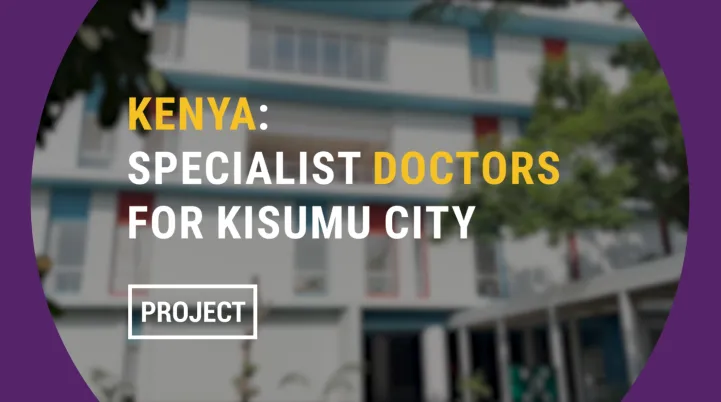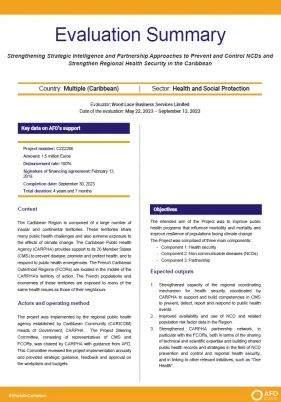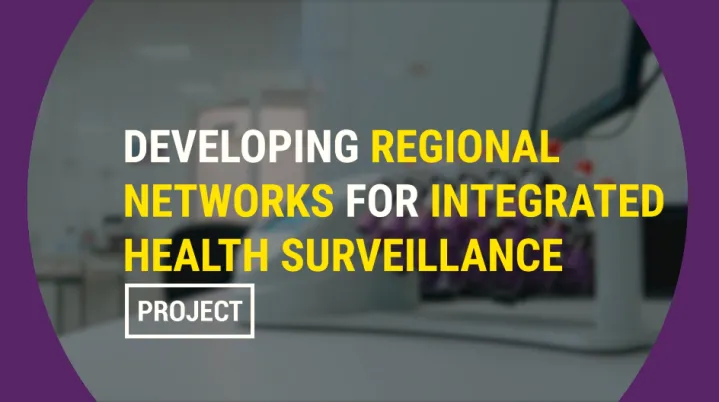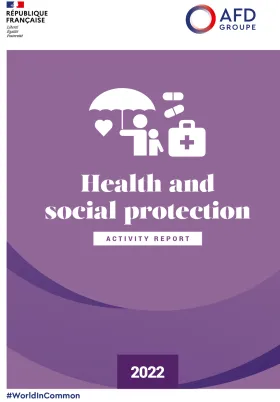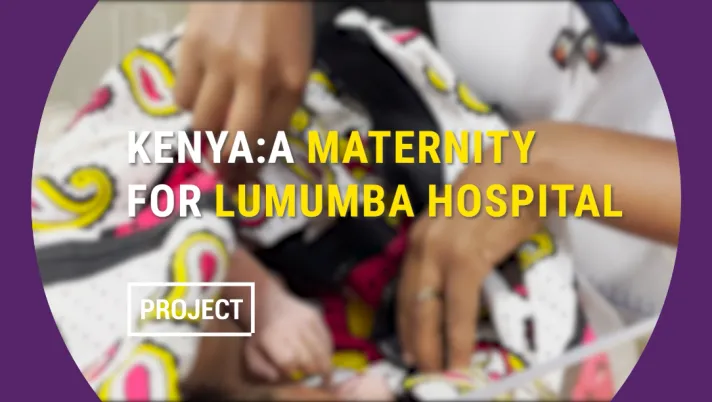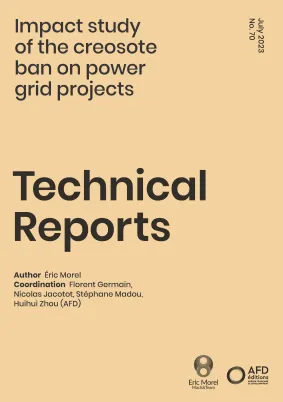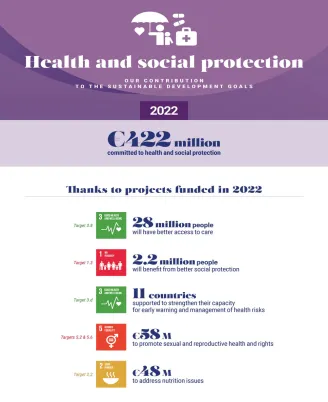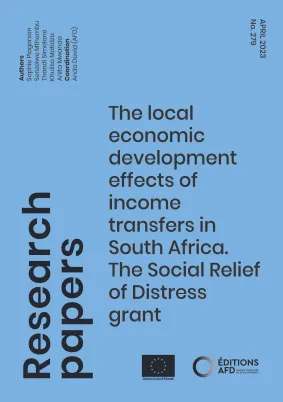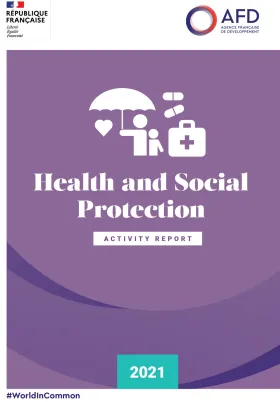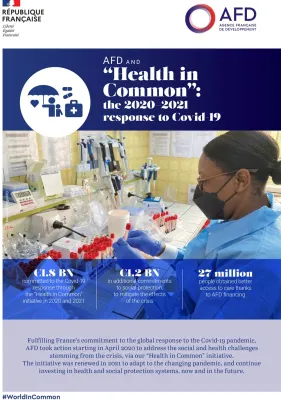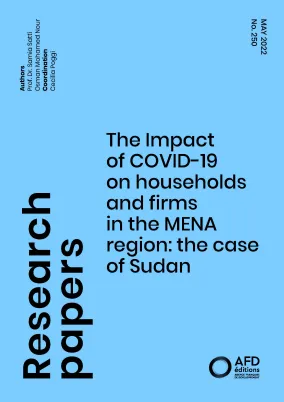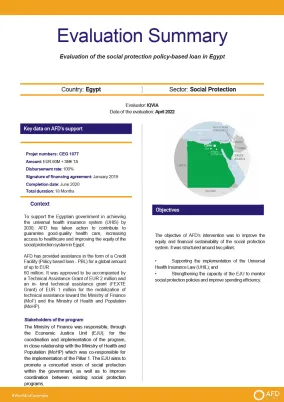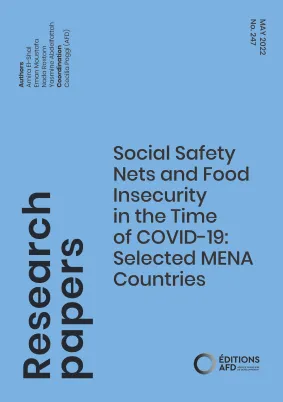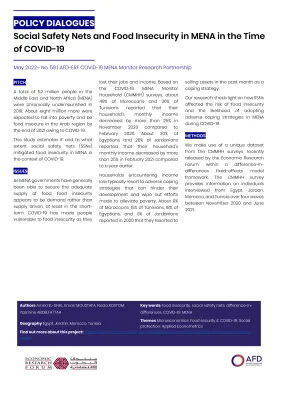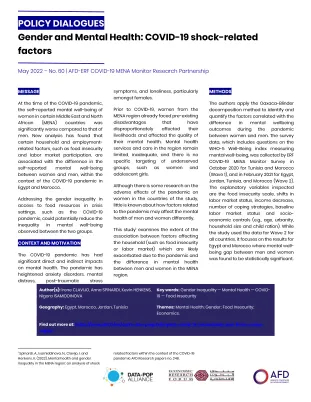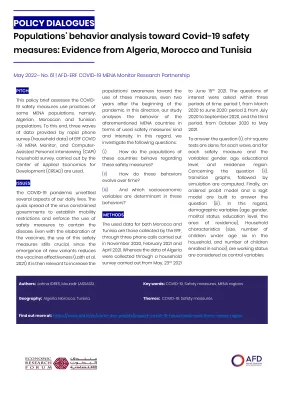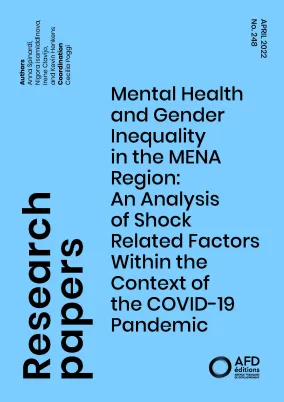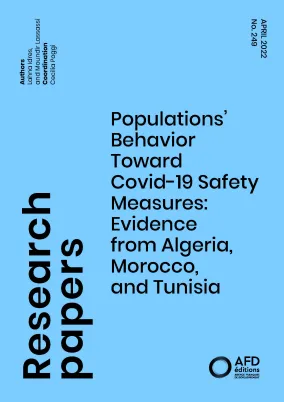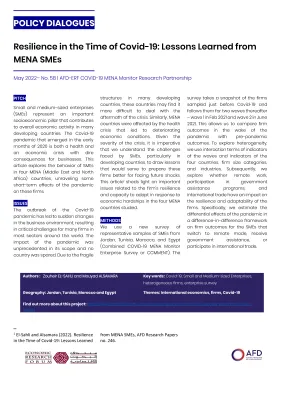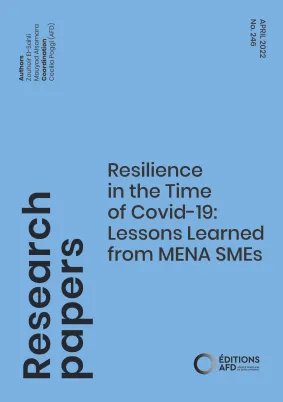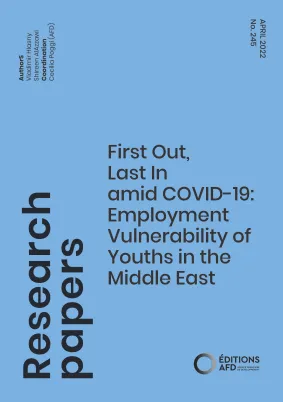Publications and media
Kenya: specialist doctors in Kisumu City
In Kisumu, Kenya's third largest city, access to healthcare remains limited. This is why AFD has supported the extension of the Aga Khan Hospital in Kisumu, which aims to improve access to healthcare,...
Published on
Evaluation of the project Strengthening Strategic Intelligence and Partnership Approaches to Prevent and Contr...
The intended aim of the Project (CZZ2266) was to improve public health programs that influence morbidity and mortality and improve resilience of populations facing climate change. The Project was c...
Published on
Developing regional networks for integrated health surveillance
Avian flu, Ebola, Chikungunya or Covid-19... These emerging diseases are coming from animals. Agence Française de Développement is promoting a new approach to health policies, to better acknowledge t...
Published on
Health and Social Protection - 2022 Activity Report
Two years after the outbreak of the Covid-19 epidemic, the health emergency and the priorities to which it has given rise, have gradually given way to structural challenges faced by health and social...
Published on
Kenya: a maternity ward for Lumumba hospital
Once a modest health center, the Lumumba establishment has become a reference hospital in Kisumu, au Kenya. It received support from AFD for its expansion and equipment, which allowed it to open a mat...
Published on
Impact study of the creosote ban on power grid projects
Throughout the world, a vast majority of electric utility poles are made of wood. To increase the service life of these poles and improve their durability against various types of deterioration (insec...
Published on
Infographic - Our health and social protection commitments 2022
The Covid-19 pandemic revealed the urgent need to invest more in making health and social protection systems more resilient to current and future crises, whether related to health, climate, the econom...
Published on
The local economic development effects of income transfers in South Africa. The Social Relief of Distress gran...
Following the onset of COVID-19 in April 2020, this qualitative study considered the effects of the Social Relief of Distress (SRD) grant on local economies in five urban and peri-urban locations in S...
Published on
Health and Social Protection - 2021 Activity Report
The Covid-19 epidemic is a reminder to us all of the critical importance of health and social protection in a world threatened by environmental crises. The multidimensional and long-lasting nature of...
Published on
AFD and Health in Common
Fulfilling France’s commitment to the global response to the Covid-19 pandemic, AFD took action starting in April 2020 to address the social and health challenges stemming from the crisis, via our “He...
Published on
The Impact of COVID-19 on households and firms in the MENA region: the case of Sudan
This paper aims to discuss the status of households and firms during the COVID-19 pandemic in Sudan as a case study of the MENA countries. It is based on new primary data obtained from ERF COVID MENA...
Published on
Evaluation Summary - Social protection policy-based loan, Egypt
The objective of AFD’s intervention was to improve the equity and financial sustainability of the social protection system. It was structured around two pillars: - supporting the implementation of t...
Published on
Social Safety Nets and Food Insecurity in the Time of COVID-19: Selected MENA Countries
COVID-19 is testing food and social protection systems in the Middle East and North Africa (MENA) region at an unprecedented scale. Countries responded by expanding social safety nets (SSNs) and/or di...
Published on
Social Safety Nets and Food Insecurity in MENA in the Time of COVID-19
A total of 52 million people in the Middle East and North Africa (MENA) were chronically undernourished in 2019. About eight million more were expected to fall into poverty and be food insecure in the...
Published on
Gender and Mental Health: COVID-19 shock-related factors
At the time of the COVID-19 pandemic, the self-reported mental well-being of women in certain Middle East and North African (MENA) countries was significantly worse compared to that of men. New analys...
Published on
Populations' behavior analysis toward Covid-19 safety measures: Evidence from Algeria, Morocco and Tunisia
This policy brief assesses the COVID-19 safety measures use practices of some MENA populations, namely: Algerian, Moroccan and Tunisian populations. To this end, three waves of data provided by rapid...
Published on
Mental Health and Gender Inequality in the MENA Region: An Analysis of Shock Related Factors Within the Contex...
This paper investigates the potential associations between factors that affected households during the pandemic (such as food insecurity) and the gendered mental health inequalities in the MENA region...
Published on
Populations' Behavior Toward Covid-19 Safety Measures: Evidence from Algeria, Morocco, and Tunisia
The present study aims to analyze the populations’ behavior toward COVID-19 safety measures in each of Algeria, Morocco, and Tunisia. In this direction, a particular focus is put on which safety measu...
Published on
Resilience in the Time of Covid-19: Lessons Learned from MENA SMEs
Small and medium-sized enterprises (SMEs) represent an important socioeconomic pillar that contributes to overall economic activity in many developing countries. The Covid-19 pandemic that emerged in...
Published on
Resilience in the Time of Covid-19: Lessons Learned from MENA SMEs
We investigate the effects of the Covid-19 pandemic on small and medium-sized enterprises (SMEs) in four non-oil-exporting MENA countries (Jordan, Morocco, Tunisia, and Egypt). Using data from a recen...
Published on
First Out, Last In amid COVID-19: Employment Vulnerability of Youths in the Middle East
This study estimates the impacts of the evolving COVID-19 crisis on the trends in workers’ employment outcomes in Egypt and Jordan. Using panel microdata from ERF COVID-19 MENA Monitors, waves 1–5 (Ju...
Published on

